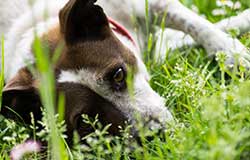Grapefruits are tart citrus fruits that are revered for their health benefits. For humans, grapefruits are an excellent source of antioxidants, vitamins, nutrients, and even fiber. They’re often considered to be one of the healthiest citrus fruits that you can eat, surpassing even oranges.
Some studies have even shown that grapefruits can help promote weight loss and reduce the risks of heart disease.

With all of those health benefits, some dog owners have contemplated introducing the fruit into their pup’s diet or giving them some grapefruits snacks every one in a while. But is that a good idea?
Can Dogs Eat Grapefruit?
While grapefruits may be good for us humans, they should not be consumed by dogs. Grapefruits are toxic to dogs. Certain components and nutrients within the fruit can wreak havoc on your dog’s system.
In addition to extreme discomfort, the toxins within grapefruit can be fatal for canines if enough of it is consumed.
What Makes Grapefruit So Toxic to Dogs?
It’s important to remember that dogs are biologically different than humans. While we may share similar organs, their bodies work in vastly different ways. Thus, dogs don’t process foods the same way we do.
It’s for this reason that dogs can’t eat grapefruit, chocolate, and a slew of other foods that we eat every day.
The offenders in grapefruit are psoralens, essential oils, and citric acid. The psoralens can be found in the flesh of the grapefruit. In the rind and seeds, they are in very high concentrations.
Essentially, psoralens are light-sensitive compounds that can absorb ultraviolet light. When they are consumed by a dog, they can cause phototoxic dermatitis.
With this condition, your dog will develop serious photosensitivity. Exposure to the sun can lead to serious burns and skin legions, forcing you to keep them indoors.
The second dangerous component is essential oils. They can be found in the rind of the grapefruit and contribute to that signature citrus smell.
Unfortunately, the essential oils are highly toxic to dogs. Their bodies can’t process the oils efficiently, which often results in organ damage.
Finally, we have citric acid.
Citric acid is found in all citrus fruits. However, it’s very concentrated in grapefruits. Thus, eating the flesh of the fruit results in severe gastrointestinal upsets.
The citric acid is capable of throwing the digestive system all out of whack.
Your dog’s gut is home to healthy bacteria that breaks down food and keeps them regular. Introducing a harsh acid into the mix can kill the bacteria, which results in diarrhea, vomiting, and significant pain.
What Happens If a Dog Eats Grapefruit?
Unfortunately, it doesn’t take much grapefruit to do damage. Even a small amount that your dog managed to pick out of the garbage can lead to serious symptoms.
The first sign that something is wrong is usually vomiting.
While your dog might not know what’s going on, their body is attempting to purge itself of the toxins. Your dog may vomit several times throughout the day.
Next, diarrhea is pretty common. This usually occurs several hours after your dog ate the fruit. As we mentioned earlier, the citric acid doesn’t agree with canine digestive tracts. Diarrhea indicates that the damage has been done.
The citric acid affected the bacteria, which resulted in poor absorption of their food. Depending on the severity of diarrhea, your dog may start to exhibit signs of dehydration.

In serious cases, your dog might even develop skin lesions due to photosensitivity. The problem often manifests itself after your daily walk in the sun.
You might notice red itchy patches of skin and bald spots.
Finally, your dog may show signs of depression and lethargy. Consuming toxins will take a toll on your dog’s body, making them feel weak and tired.
What to Do If Your Dog Ate Grapefruit
After your dog has eaten grapefruit, you need to take them to a vet as soon as possible. Treatment relies heavily on purging the system of the toxins.
The quicker that your dog can receive medical attention, the better.
Of course, the way your vet will treat the problem depends on the timeline of events and how much grapefruit your dog ate.
Induce Vomiting
Usually, vets will induce vomiting if your pup’s snacking wasn’t that long ago. In some cases, this is all that needs to be done.
If you catch your dog immediately and induce vomiting quickly, you can remove the toxins before they are absorbed by the body.
In the event that too much time has passed, the vet may also introduce activated charcoal into your dog’s system.
The charcoal binds and neutralizes the toxins before they’re fully absorbed by the body. They can then be excreted through the digestive system.
Additional treatment methods may be used as well to treat the symptoms of poisoning. For example, your vet might insert an IV for fluid therapy after extreme diarrhea and vomiting.
Creams and topical medication might be applied to skin lesions as well.
Generally, dogs will get back to normal once the toxin has exited the body. In most cases, there are no lasting side effects to worry about.
Conclusion
Grapefruit poisoning is no joke. The fruit can cause some serious damage to your dog’s body, so you must keep the fruit away from them.
Put fencing around any trees you have on your property and invest in a locking trash can to ensure that your pup doesn’t eat your grapefruit leftovers.
Also Read: 7 Best Dog Foods for Goldendoodles

